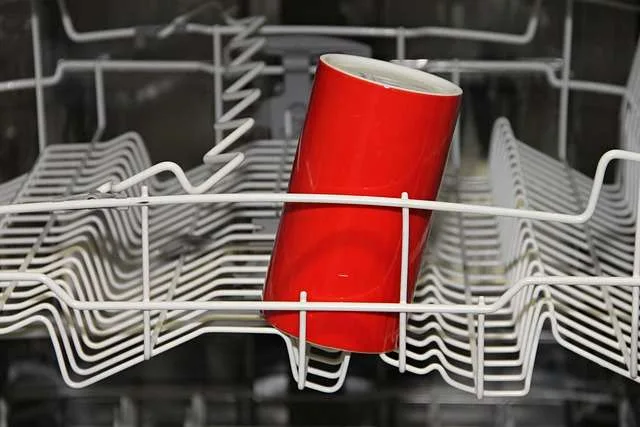HOW HOT DOES A DISHWASHER GET? EVERYTHING YOU NEED TO KNOW
A dishwasher is more than just an appliance taking up precious real estate in your kitchen. It’s a severe appliance meant to take on the hard work of cleaning your dishes and utensils. Ideally, you want to be sure that your dishwasher operates at a hot enough temperature to kill any bacteria. While still being gentle enough to preserve the life of your dishes. Today, we will discuss the answer to the age-old question – how hot does a dishwasher get? We’ll cover the temperature of a dishwasher and any associated risks that come with higher temperatures. So buckle up and hang on tight – we’re about to dive into the science of hot dishwashers!
WHAT IS THE TYPICAL WATER TEMPERATURE FOR A DISHWASHER?
When we talk about dishwasher temperatures, to understand the difference between water and air temperature, the typical water temperature for a dishwasher can range from 120-140 degrees Fahrenheit. This range allows for proper sensitization by removing bacteria from the dishes with high-level heat. Some newer models are designed with higher increases in water temperature up to 160-180 degrees.
Fahrenheit is a means of providing even more thorough cleaning.
Just as too low of a water temperature may not be enough to remove all the bacteria, using highly concentrated soap. Boiling water can cause damage to delicate dishware and containers.
One must be mindful when selecting one’s washer cycle and choosing something that is not too drastic and balances thorough cleaning with protecting one’s dishes. Selecting a suitable cycle could result in improved energy efficiency since the motor won’t need as much energy to heat cold water.
The debate around typical dishwasher water temperatures goes beyond user preferences.
Now that we understand more about the typical water temperature for a dishwasher. Let us move on to understanding the temperature differences based on individual settings.
DIFFERENCES IN TEMPERATURES BASED ON THE CYCLE
The temperature of a dishwasher during each cycle can vary depending on the model and technology utilized. Most dishwashers will reach temperatures of between 120°F and 150°F. Usually, these temperatures are only seen at the end of the cleaning cycle when all residue needs to be removed. For example, sanitizing cycles in newer models often require a temperature of 170°F for a specific duration to disinfect the dishes thoroughly.
Some argue that warm water does not reach the same level of cleanliness as hot water. This is because detergent solids can dissolve fully in hot water at over 130 degrees Fahrenheit. Whereas cold or cool water may not dissolve the detergent as quickly and effectively. Furthermore, heat plays an integral part in breaking down fats often found on dirty dishes. Thus, using too little heat can cause a less effective cleaning process, especially if there is a lot of grease or food residue on the dishes. On the other hand, many energy-saving dishwashers use lower temperatures while still achieving excellent results.
New low-temperature models use technologies such as pressure spray arms. And filter systems and heated drying cycles to ensure all debris is removed from dishes with minimal energy consumption.
Before selecting a dishwasher, it’s essential to understand what temperature cycles are available and whether they suit your household’s needs. Knowing how much heat is used during each cycle will help you make an informed buying decision that fits your lifestyle and budget. With this knowledge in mind, let’s discuss how hot the inside of a dishwasher gets.
-
The average temperature for a hot cycle in a residential dishwasher is 130 to 140 degrees Fahrenheit.
-
A commercial dishwasher has an average temperature of 180 degrees Fahrenheit.
-
The water temperature inside the heated tank of a domestic dishwasher can reach up to 149°F/65°C.

TEMPERATURE REGULATION AND SAFETY FEATURES
Regarding dishwasher temperature regulation and safety features, it’s essential to understand the different device components involved. Dishwashers are made of a heating element and temperature sensor, which regulate the water temperature for optimal cleaning results. The heating element heats the water to an appropriate temperature. Meanwhile, the temperature sensor ensures the water does not exceed a certain heat threshold. This prevents any accidents that could occur if the dishwasher gets too hot.
There is some debate about what is considered “too hot” regarding dishwasher use. For example, some people argue that 140°F (60°C) is hot enough for effective cleaning. Others insist water should never exceed 120°F (49°C) to prevent dish harm and potential scalding injury. It’s important to note that newer dishwashers may have adjustable temperature settings. Users can tailor the dishwashing experience to whatever items need cleaning.
To further ensure safe operation. Many modern dishwashers are also equipped with thermal fuses or overload protection switches, Which will shut off power if the machine gets overly heated or overloaded. In addition, some models have pressurized valves to separate the unit’s hot and cold water sources. This helps avoid sudden pressure increases and ultimately increases safety.
DOES THE HOT WATER TEMPERATURE SANITIZE THE DISHES?
It is essential to consider the temperature of the water used in a dishwasher when determining its cleaning ability. Whether or not it can adequately sanitize. The U.S. Department of Health recommends that the water temperature of a dishwasher be at least 140 degrees Fahrenheit. Most modern dishwashers are designed to reach this water temperature.
Regardless of the given cycle temperature, however, it is essential to note if insufficient detergent is used. Even boiling water may not be enough to clean the dishes properly. This is because detergents contain surfactants that help form soapy lathers. Only a fraction of fat particles can be removed without soap, while mechanical energy provided by turbulence alone isn’t enough to draw more greasy dirt particles.
Additionally, detergents contain sequestrant agents acting as soap stabilizers by capturing ions in solution, which would otherwise reduce their effectiveness. Thus, although hot water temperatures raise cleaning efficiency, they are still limited by how much detergent is used in a washing cycle and, therefore, cannot respond solely to temperature. Understanding how different types of detergents affect a dishwasher’s water temperature is essential for optimal sanitizing.
CONCLUSION
When asking the question ‘How hot does a dishwasher get?’ it is essential to remember that different dishwashers can deliver varying levels of heat to dishes. Generally, the hottest setting on most dishwashers ranges from around 140°F up to 170°F, depending on the make and model. Moreover, some newer models may reach temperatures as high as 180°F for optimal disinfecting power.
Some studies have suggested that bacteria can become resistant to higher temperatures; this should not be seen as a problem with home dishwashing machines. With proper cleaning techniques. Most households can be assured that their dishwashers are delivering sufficient heat for safe and effective cleaning.
[joli-toc]

call us at!